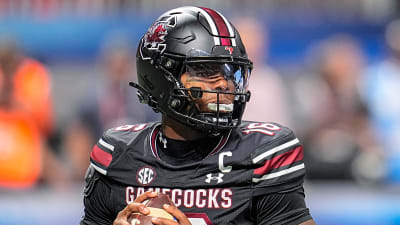Monday was most likely the most unusual day Mark Few has had in his 27 years as the head coach of the Gonzaga men's basketball program.
There hasn't been any other instance in which he's experienced a wave of emotions, like the ones he was feeling after hearing Judge Maria Polin grant Tyon Grant-Foster a preliminary injunction, allowing him to play for the Bulldogs this season and ending a tiresome eligibility saga that began in June; only to then rush from the courthouse to the basketball court so he could tend to his coaching duties.
Nonetheless, it was a day that'll go down in Zags lore forever.
"It was tough turnaround there with how it all transpired," Few said after Gonzaga's exhibition win over Eastern Oregon on Monday. "Tyon and I rushed down here and got him semi-warmed up, and got him out there on the floor. But the reaction in the locker room was priceless, that it's something I'll never forget. They were already dressed and ready to go by the time we got here."
The gap in between Polin's verdict from Spokane County Superior Court and Grant-Foster's unofficial Gonzaga debut inside McCarthey Athletic Center was about 90 minutes, leaving very little time for Few and Grant-Foster to process much of what had just happened over the past 2.5 hours.
A strong Gonzaga contingent consisting of Braeden Smith, Jalen Warley, Steele Venters and Few was in attendance for Grant-Foster's hearing, though his head coach was the only one who was able to stay the entire duration while his teammates left early to prepare for the 6 p.m. tip off against the Wolves.
"He's family," Few said of being in the courtroom to support Grant-Foster. "He's one of our guys and and it's just kind of how we roll around here. [Being there] was a no-brainer, and it went long and I was there till the end."
Monday's hearing took place after U.S. District Judge Thomas Rice denied the NCAA's motion last week to move Grant-Foster's case to the federal court level, remanding it back to Spokane County Superior Court for a session set the day before the school's deadline to honor winter scholarships.
As such, Grant-Foster's attorney, Carl Oreskovich, re-emphasized how important it was for Polin to make a ruling after she commented following a 10-minute break that the hearing was only supposed to last an hour.
Oreskovich and North Carolina attorney Elliot Abrams made opening arguments that revolved around antitrust laws and the "Pavia waiver" — citing the temporary waiver the NCAA granted for student-athletes who played at a non-NCAA institution, like a JUCO, and would have exhausted their eligibility after the 2024-25 academic year another season of eligibility. Oreskovich pointed to the several other exceptions the NCAA has for granting players an extra year, many of which are done by choice, though Grant-Foster missing two seasons because of his heart condition wasn't his own doing.
"Had he been medically able, judge, to go and do foreign study, foreign services, foreign peace corps; we wouldn't be here because it's already determined to be an exception [by the NCAA]," Oreskovich said. "So to determine whether or not [the NCAA] discriminated against [Grant-Foster]; they are treating him, with a member of a protected class, different than those people who are not members of that class."
Matthew Ralph, representing the NCAA, claimed that eligibility rules help maintain the integrity of the sport, much like the WNBA not allowing men to compete or the Paralympics barring able-bodied people from participating. Ralph also argued Grant-Foster was still able to play two seasons of JUCO and two more after he collapsed, giving him four years of eligibility. Grant-Foster played for Grand Canyon in 2023-24, earning Western Athletic Conference Player of the Year honors, then appeared in 26 games last season.
The NCAA also argued that Grant-Foster could've filed his lawsuit sooner, though it was actually filed before the NCAA notified Gonzaga it denied his eligibility waiver. Gonzaga submitted an initial waiver request for Grant-Foster's eligibility in June — only to have it denied less than three weeks later. A request for reconsideration was made on July 17 and was rejected in September. The most recent appeal, made on Sept. 25, was denied earlier in October.
In addition to granting him eligibility, Polin also granted Grant-Foster an injunction that'll protect him from the NCAA's restitution rule, which allows the governing body to strip an institution and its athletes of any awards or championships if a court-ordered injunction allows an ineligible athlete to play, and that injunction is later overturned.
"I want to applaud Judge Polin and sitting in there and going through that whole process," Few said. "I mean, listening to those arguments, both sides, both attorneys. You got to filter through a lot of information, and then she succinctly, just summed it all up at the end. It was very impressive, taking notes and addressing everything. And at least, in my opinion, justice was served."
WATCH THE FULL VIDEO:
MORE GONZAGA NEWS & ANALYSIS
More must-reads:
- From the Boozer twins to a high-flying Eagle: Must-know names for the 2025–26 men's college basketball season
- Five must-watch games of opening week of men's college basketball season
- The 'World Series single-game K leaders' quiz
Breaking News
Trending News
Customize Your Newsletter
 +
+
Get the latest news and rumors, customized to your favorite sports and teams. Emailed daily. Always free!








